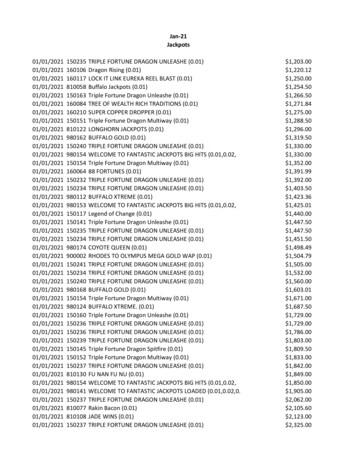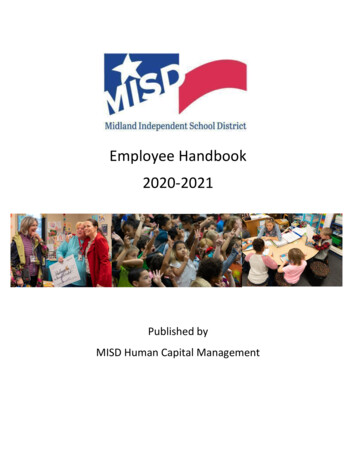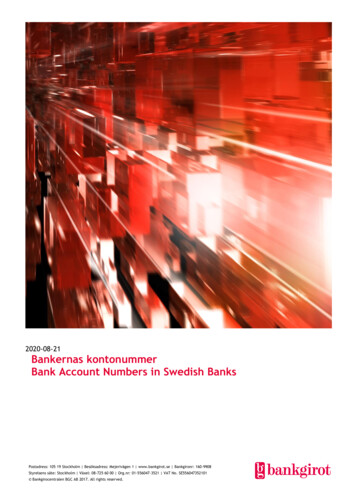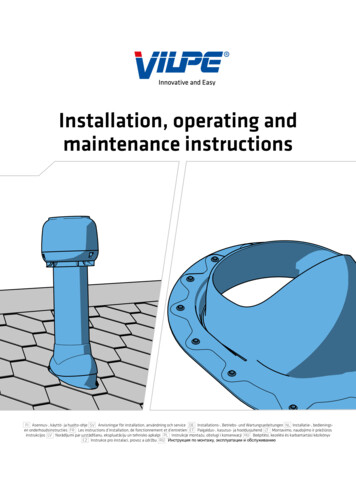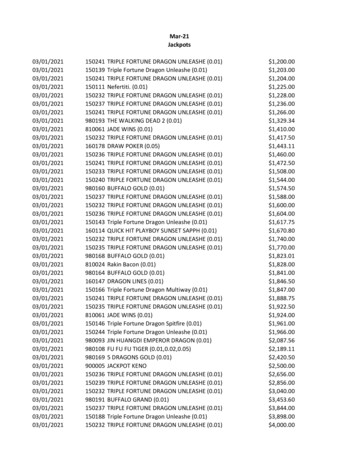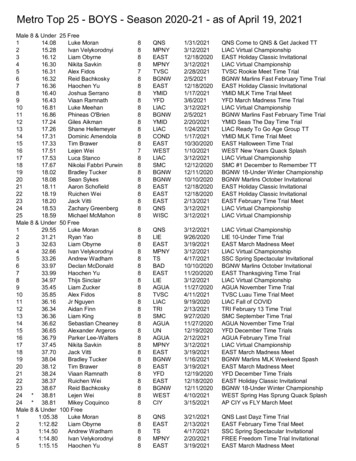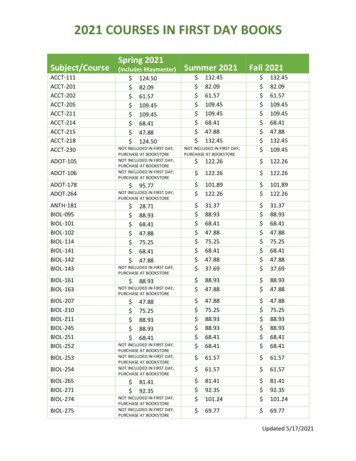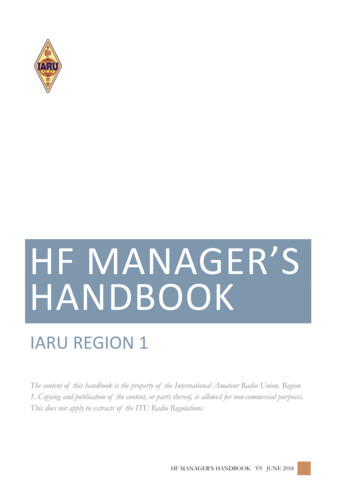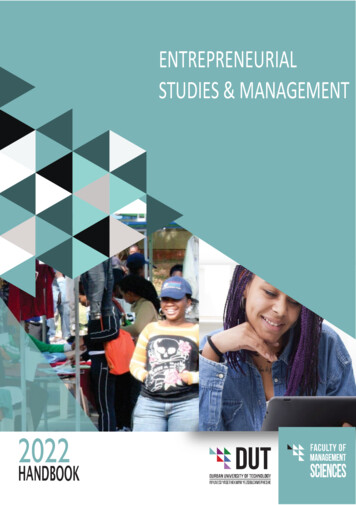
Transcription
ENTREPRENEURIALSTUDIES & MANAGEMENT2022HANDBOOK
2022DEPARTMENT OFENTREPRENEURIALSTUDIES &MANAGEMENTHANDBOOKFaculty of Management Sciences
VISION OF THE DEPARTMENT OFENTREPRENEURIAL STUDIES & MANAGEMENTTo be the department of choice in KwaZulu-Natal for both undergraduate and postgraduate studies in entrepreneurship and business administration/management.DEPARTMENTAL MISSION STATEMENTTo develop the knowledge, skills and attributes of students in the areas ofentrepreneurship and business administration/management, with a view to promotingentrepreneurship and effectiveness and efficiency in organisations.What is a University of Technology?A university of technology is characterized by being research informed rather thanresearch driven, where the focus is on strategic and applied research that can betranslated into professional practice. Furthermore, research output is commercialized,thus providing a source of income for the institution. Learning programmes, in whichthe emphasis on technological capability is as important as cognitive skills, aredeveloped around graduate profiles as defined by industry and the professions.
CONTENTSPage1.Contact Details12.Staffing23.Programmes offered by the Department34.Minimum admission requirements and programme structure35.Registration and Re-Registration Rules96.Module Contents12IMPORTANT NOTICEThe departmental rules in this handbook must be read in conjunction with the DurbanUniversity of Technology’s General Rules contained in the current General Handbookfor Students.NOTE TO ALL REGISTERED STUDENTSYour registration is in accordance with all current rules of the Institution. If, forwhatever reason, you do not register consecutively for every year of your programme,your existing registration contract with the Institution will cease. Your re-registrationanytime thereafter will be at the discretion of the Institution and, if permitted, will be inaccordance with the rules applicable at that time.
1. CONTACT DETAILSAll departmental queries to:Secretary:Tel No:E-mail:Location of Department:Ms Nonhlanhla Mdakane031- 373 5147mdakanena@dut.ac.za6th floor, B Block,ML Sultan Campus, ML Sultan RoadDurbanAll Faculty queries to:Faculty officer:Tel No:E-mail:Location of Faculty office:Mrs Lindiwe N. Zwane031- 373 5156LindiweZ1@dut.ac.za1st floor, A BlockML Sultan Campus, ML Sultan RoadDurbanExecutive Dean:Tel No:Location of Executive Dean’s office:Prof. F.G. Netswera031- 373 51301st floor, A Block,ML Sultan Campus, ML Sultan RoadDurban1
2. STAFFING (Name and Qualifications)Head of Department:Associate DirectorSenior LecturersProf. R.W.D. Zondo [D. Com (UNIZUL); MBA (DUT); BTech: Management (DUT); ABP (BSU); ND: Org. & WorkStudy (UNISA); ND: Forestry (Fort Cox College)]Mr L. Kaplan [M. Phil. (Stellenbosch); B.Com. Hons.(UNISA); ND: Clothing Production Management (TN)]Dr S. Chetty [D.Com (UKZN); MBL (UNISA); B. Com(Hons); B. Paed. (Commerce) (UDW)]Prof. I.G. Govender [DPA (UKZN); MBA (UDW); B.Sc.(UDW); B. Com. (UNISA); BA: Law (UNISA); PG Diploma:Personal Financial Planning (UOFS)]LecturersMs L. Brady [MMSc. (Business Administration) (DUT); BBA /B.Com (Hons) (Andrews University]Mrs J. Maome [M Tech: Business Admin. (DUT); B Tech:Management (DIT); ND: Mngt. (TN)]Ms B.B. Mbinda [MBA (CPUT); B Tech: BusinessAdministration (CPUT); B Tech: Public Management(PENTECH); ND: Public Management (PENTECH)]Ms T.P Ndlovu [MMSc. (Hosp. & Tourism) (DUT); B Tech:Tourism Mngt. (DUT); ND: Ecotourism Mngt. (DUT)]Mr B.M. Msengi [MBL (UNISA); PGD in HIV Mngt. (US); BTech (Tourism Mngt.); Diploma in Marketing &Communication (AAA School of Advertising)]Mr S.S. Mtshali [M. Tech (Business Administration); B Tech(Management): ND: Management (DUT)]Mr P.S. O’ Jageer [MBA (MANCOSA); B Com (Hons);UHDE; B. Com (UDW); ND: Credit Management ICM)]Ms S. Pillay [MBA (MANCOSA); BA Soc. Sc.; B. Admin(Hons) (UDW); PGD: Ed. Man. (UNISA)]Mrs I. Schofield [M. Ed. (UKZN); B. Tech.: HRM (TN); N.D.:Personnel Management (TN)]2
3. PROGRAMMES OFFERED BY THE DEPARTMENTThe Department offers the following programmes that are registered with the Departmentof Higher Education and approved by the Council on Higher cationsHigher Certificate in Business AdministrationDiploma in Management Sciences (Business Administration)Advanced Diploma in Management Sciences (BusinessAdministration)Postgraduate Diploma in Management Sciences (BusinessAdministration)Master of Management Sciences (Business Administration)D Phil. in Management Sciences (Business Administration)4. MINIMUM 96817ANDPROGRAMMEHIGHER CERTIFICATE IN BUSINESS ADMINISTRATIONMinimum Admission requirementsIn addition to Rule G7, applicants with a National Senior Certificate (NSC) or aSenior Certificate (SC) qualification must score a minimum of 20 points, andachieve a minimum rating/symbol for English as reflected in the Table below. Applicantswith a National Certificate (Vocational) level 4 qualification must score aminimum of 50% for English or Communication.NSCRating3Compulsory SubjectsEnglish home language/English firstadditional language/CommunicationHGESCSGDNCV50%The total points scored by an applicant with a National Senior Certificate (NSC)will be calculated as follows:3
Percentage Rating90 - 100%780 - 89%770 - 79%660 – 69%550 – 59%440 – 49%330 – 39%20 – 29%1Points87654321The total points scored by an applicant with a Senior Certificate (SC) will becalculated as follows:SymbolABCDEF In calculating the total points scored by an applicant, the ratings/symbols achievedfor Life Orientation and more than one additional language will be excluded.Programme StructureHIGHER CERTIFICATE IN BUSINESS ADMINISTRATIONSemester Assessment NQF SAQALevel Credits1ContinuousIntroduction to Business520Assessment1ContinuousFinancial Literacy512Assessment1ContinuousIntroduction to Technology512Assessment1ContinuousCornerstone 101512AssessmentFundamentals of Business Administration2Continuous516Modules4
Business Comm. and Information Literacy2Introduction to Entrepreneurship2Introduction to Business mentContinuousAssessment5165165164.2 DIPLOMA IN MANAGEMENT SCIENCES (BUSINESSADMINISTRATION)Minimum Admission requirementsApplicants with a National Senior Certificate (NSC) qualification must score aminimum of 25 points, excluding Life Orientation, and must achieve the minimumratings reflected below for the following subjects:SubjectsMinimumRatingEnglish (Home)3OR English First Additional Language4Mathematics3OR Mathematics Literacy4And two (2) 20 credit subjects (not3more than one language)If an applicant wrote seven subjects, then the best six marks attained, which mustinclude English and Maths/Maths Literacy, but exclude Life Orientation, will be used tocalculate the points. The points will be allocated as follows:Percentage Level90 - 100%780 - 89%770 - 79%660 – 69%550 – 59%440 – 49%330 – 39%20 – 29%1Points87654321Applicants with a Senior Certificate (SC) qualification must score a minimum of 25points, and must obtain a minimum symbol of E on the Higher Grade or D on the5
Standard Grade for both English and Accounting. If an applicant wrote seven subjects,then the best six marks attained, which must include English and Accounting, and onlyone other language, will be used to calculate the points. The points will be allocated dGrade(SG)654321ORA National Certificate (Vocational) Level 4 issued by the Council for General andFurther Education and Training with: at least 50% in three fundamental modules, including English, andat least 60% in three compulsory vocational modulesORAdmission may be granted via mature age exemption to applicants who are 23 years orolder, and possess a minimum of 3 years’ work experience in a related field. Applicantsmay also be accepted into the programme via the Recognition of Prior Learning (RPL)process.DIPLOMA IN MANAGEMENT SCIENCES (BUSINESS ADMINISTRATION)ModulesCornerstone 101Academic LiteracyIntroduction to BusinessLaw for LifeQuantitative Approaches toManagement SciencesKZN Maritime HeritageIntroduction to Business LawAssessment:Continuous NQFAssessment Level(CA) --------1216168CA5---8CACA55-----8166
Time and Stress ManagementEnvironmental SustainabilityFinancial LiteracyBusiness Communication &Information LiteracyManagement 1Finance for ManagersAdministrative Management 1Introduction to TechnologyManagement 2Financial Management 2Administrative Management 2Introduction to -Management 1Finance for ManagersAdministrative Management 1Quantitative App. to Mngt.SciencesManagement 2Financial Management 2Administrative Management 2Management 3Financial Management 36Administrative Management 3126---166---16Management 3ExaminationFinancial Management 3ExaminationAdministrative Management 3 ExaminationApplied ManagementCAApplied Financial ManagementCAApplied AdministrationCAManagementEntrepreneurial SkillsExaminationOperations ManagementExam./CA/Exam.OR Logistics ManagementTOTAL4.3161616121616360ADVANCED DIPLOMA IN MANAGEMENT SCIENCES (BUSINESSADMINISTRATION)(This programme is offered on a part-time basis only, with lectures scheduledbetween 5 - 8 pm on weekdays).Minimum admission requirementDiploma in Management Sciences, specialising in Business Administration, or acognate/related three-year, 360 credit qualification at NQF level 6.Programme structureModulesProject ManagementOrganisational BehaviourResearch MethodologySemester Assessment NQF SAQALevel 0Assessment7
Corporate Governance and BusinessEthicsAdvanced Strategic ManagementAdvanced Financial on772020POSTGRADUATE DIPLOMA IN MANAGEMENT SCIENCES(BUSINESS ADMINISTRATION)(This programme is offered on a part-time basis only, with lectures scheduledbetween 5 - 8 pm on weekdays).Minimum admission requirementAdvanced Diploma in Management Sciences, specialising in Business Administration, ora cognate/related qualification at NQF level 7.Programme structureModulesBusiness Research ProposalNQF SAQALevel inationExamination724772020Applied Strategic Management11International BusinessBusiness Research Report2EntrepreneurshipInnovation & Change Management224.5 MASTERS OF MANAGEMENT SCIENCES (BUSINESS ADMINISTRATION)The minimum admission requirement for the Masters of Management Sciences(Business Administration) is a Postgraduate Diploma in Management Sciences,specialising in Business Administration, or a cognate NQF 8 qualification, or a B.Tech: Business Administration, or a cognate B. Tech qualification. Only applicantswith an average score of 60% or higher in the qualifying qualification will beconsidered for enrolment into the programme.AssessmentMethod100% research. The final dissertation will be assessed by twoexternal examiners8NQFLevel9
4.6 D. PHIL. IN MANAGEMENT SCIENCES (BUSINESS ADMINISTRATION)The minimum admission requirement for the D. Phil in Management Sciences(Business Administration) is the Masters in Management Sciences (BusinessAdministration), or a cognate Master’s Degree at NQF level 9.AssessmentMethodNQFLevel100% research.The final thesis will be assessed by three external examiners, twowithin South Africa and on from outside South Africa105.REGISTRATION AND RE-REGISTRATION RULES5.1Registration for the Higher Certificate in Business dents registering for the Higher Certificate in Business Administration arerequired to meet the minimum requirements detailed in 4.1 above. Applicationsreceived via the Central Applications Office (CAO) will be scored and rankedfrom highest to lowest. Based on these rankings, those students with the highestpoints will be offered a firm place. Students who have applied with their grade 11results may be offered a place, subject to their final grade 12 examination resultsmeeting the minimum requirements stated in 4.1 above.This course is offered on a semester basis and registration takes place in January.See General Rules G3, G4, G5, G6 and G7.The last date for acceptance of late enrolments or transfers from otherdepartments will be four weeks from the commencement of lectures.Registration nessStudents registering for the Diploma in Management Sciences (BusinessAdministration) are required to meet the minimum requirements detailed in4.2 above. Applications received via the Central Applications Office (CAO)will be scored and ranked from highest to lowest. Based on these rankings,those students with the highest points will be offered a firm place. Studentswho have applied with their grade 11 results may be offered a place, subjectto their final grade 12 examination results meeting the minimum requirementsstated in 4.1 above.The programme is offered on a semester basis and registration takes place inJanuary. See General Rules G3, G4, G5, G6 and G7.The last date for acceptance of late enrolments or transfers from other9
departments will be four weeks from the commencement of lectures.A student cannot register for a module if the prerequisite module, whereapplicable, is not passed.5.2.5 If a student has not met the progression rules at the end of anyyear, he/she may appeal to the head of the department.5.2.45.2.6 At the end of the fourth year, when the student appeals, the head ofdepartment will evaluate the student’s progress to establish if thereis a reasonable chance of the student completing the diploma in themaximum time (5 years), and use this to make a decision – inaccordance with the requirements of Rule G17.5.3Registration for the Advanced Diploma in Management Sciences(Business Administration)5.3.1Students registering for the Advanced Diploma in Management Sciences(Business Administration) are required to meet the minimum requirementsdetailed in 4.3 above.The programme is offered on a semester basis and registration takes placein January. See General Rules G3, G4, G5, G6 and G7.The last date for acceptance of late enrolments or transfers from otherdepartments will be four weeks from the commencement of lectures.5.3.25.3.35.4Registration for the Postgraduate Diploma in ManagementSciences (Business Administration)5.4.15.4.25.4.35.55.6Students registering for the Postgraduate Diploma in ManagementSciences (Business Administration) are required to meet the minimumrequirements detailed in 4.4 above.The programme is offered on a semester basis and registration takesplace in January. See General Rules G3, G4, G5, G6 and G7.The last date for acceptance of late enrolments or transfers from otherdepartments will be four weeks from the commencement of lectures.Registration for the Masters in Management Sciences (BusinessAdministration) and the D. Phil in Management Sciences (BusinessAdministration) – students wishing to enroll for the above programmes arerequired to meet the minimum admission requirements detailed in 4.5 and 4.6above. All registration enquiries should be directed to either Ms Jeslyn Hoover(JeslynH@dut.ac.za or 031- 3735374) or Phindo Khoza on 031 – 3736714 ornonkululekok@dut.ac.za at the Faculty of Management Sciences ResearchOffice.Work done during the semester/year5.6.1Year marks/semester marks shall be determined in accordance with the10
5.6.2requirements as indicated in the student guides. For details ofassessments, refer to the student guide pertaining to each module.Failure to meet these requirements will disqualify a student from writingthe final examination in the modules concerned.Notwithstanding Rule G12, a semester mark obtained for any module isvalid only for the main examination in the semester in which a student isregistered plus the supplementary examination in that module, if grantedto the student in terms of Rule G13.5.6.3If a student is absent for an assessment, a medical certificate must besubmitted to the lecturer concerned within seven working days from thedate that the assessment was conducted. The department reserves theright to verify any medical certificate.5.6.4Students who are absent for a formal assessment and submit a medicalcertificate to the Department will be permitted to write a make-up testin the general education modules. A make-up test replaces a single testthat has been missed in the course of the semester, and may not be usedto replace an assignment mark. If the student is absent for the make- uptest, a zero mark will be allocated. Details on whether make-up tests areoffered in other non-general education modules will be outlined in thestudent guide for each module.5.6.5Students must verify their course marks before the final examinations arewritten. A 40% semester mark is required to be eligible to write the finalexamination in a module. The pass marks for all modules is 50%.5.7Exclusion rulesNotwithstanding DUT General Rules relating to unsatisfactory students(G17, G21, G22, and G23), a student who does not pass a minimum of40% of the modules for which they are registered in a year will beprevented from re-registering for the qualification. Students will have theright to appeal against their exclusion. In calculating the time taken tocomplete a qualification, the periods of incomplete study at anotherinstitution/ programme/department will be taken into consideration.Students who are refused re-admission in terms of the University rules maymotivate, in writing, to the Head of Department to be re-admitted. The Head ofDepartment may forward a recommendation to the Faculty Board for adecision.5.8Maximum time allowed for completion of qualificationsQualificationDiplomaAdvanced DiplomaPostgraduate DiplomaMaster’s DegreeDoctorateMaximum completion time5 years2 years2 years3 years4 years (part-time)11
6. MODULE/SUBJECT CONTENTSNB: Students to read this section in conjunction with the relevant student guides.6.1 HIGHER CERTIFICATE IN BUSINESS ADMINISTRATIONIntroduction to BusinessDuration: 12 weeksEvaluation: Continuous AssessmentThe module consists of the following sections:Business EnvironmentThe nature of the business environmentExternal, market and internal environments and their inter-relationship.Environmental analysisBusiness ManagementThe nature of business management.Management concepts: Planning, organising, leading and controlling.Decision-making processCareers in Business ManagementMarketing ManagementWhat is Marketing Management?The 4P’s (Product, Price, Promotion and Place)Careers in Marketing ManagementRetail ManagementWhat is Retail Management?Functions of RetailingRetail mixRole of retail in the supply chainCareers in Retail ManagementHuman Resources ManagementWhat is Human Resources Management & Personnel Management?Careers in Human Resources ManagementPublic Relations ManagementWhat is Public Relations Management?Functions of Public RelationsCareers in Public Relations ManagementOperations ManagementWhat is Operations Management?Concepts of efficiency, factories, products, layouts and quality.Careers in Operations ManagementBusiness LawWhat is law?Business and the LawCareers in lawBusiness Communication & Information LiteracyDuration: 12 weeksEvaluation: Continuous Assessment12
The module consists of the following sections:Overview of Communication in the South African contextBegin to reflect on group roles, functions and behaviourPurpose, audience, context, conventions and types of business lettersGuidelines for Writing emailsMeetings: Types, jargon, office bearer rolesMeetings procedureMeetings Documentation: Practice writing Notice, Agenda, MinutesReport Writing: Asking questions in surveys and interviews at a basic levelInterpreting findings, and writing conclusions and recommendationsWork with topics: analyse, identify keywords and alternative terms. Combine key words to use ina search strategyWork at computers learning how to access and search in electronic sources of information.Conduct a search for relevant information on an analysed topic using a variety of differentresources.Search in Reference works such as encyclopaedias and dictionaries both in print and online.Search Library Online Public Access Catalogue.Search using a Discovery tool such as Summon. Search using a search engine such Google.Search in a relevant Library database.Evaluate the results of the searches according to specific criteria: relevance, currency,authenticity, bias and decide which information is to be usedAnswer questions about information found, or, give a presentation on information found or writea report on information foundCreate references using a system such as the Harvard Referencing System for all sources ofinformation that have been chosen for useWrite a paragraph of text demonstrating understanding of acknowledging sources as you write(in-text references)Cornerstone 101Duration: 12 weeksEvaluation: Continuous AssessmentThe module consists of the following sections:The module will start with the analysis of a current issues (one critical event or development will be andanalysed; the event in focus will be selected on the basis of its connections to the theme of journeys and itsrelevance to the issues of ethics, diversity and critical citizenry). The topics will include such topics as thefollowing, not necessarily in this sequence:Our journeys: moving into higher educationJourneys from self to community (including forms of community engagement and service)Journeys of migration, discovery and coercion (including movement of labour)Financial LiteracyDuration: 12 weeksEvaluation: Continuous AssessmentThe module consists of the following sections:Savings and budgetingDebt Reduction and Asset Building (bank statement and bank recon) (interest rate, compoundand simple)Building a good credit ratingConsumer Protection (link with law)Wages and taxation (basic categories, direct and indirect, vat, individual tax)Investment PlanningRetirement (Building a pension fund / provident fund)Introduction to Technology13
Duration: 12 weeksEvaluation: Continuous AssessmentThe module consists of the following sections: Overview of computer terminology Overview of the Ethics of Information Technology. Access to the internet, upload and downloading files Overview of MS Word Overview of a presentation package such as PowerPoint.Introduction to Business LawDuration: 12 weeksEvaluation: Continuous EvaluationThe module consists of the following sections: Basic framework of the South African legal system. General principles of the law of contract. The principles of consumer law in South Africa. Brief overview of the Basic Conditions of Employment Act 75 OF 1977. Brief overview of social security at work: Unemployment Insurance Act 63 of 2000, Compensation forOccupational Injuries and Diseases Act 130 of 1993.Specialisation specific: Legislation relating to packaging in South Africa. Intellectual property law. The law relating to electronic payment systems. Dismissals and unfair labour practice. The Labour Relations Act 66of 1995. Censorship Freedom of expressionFundamentals of Business AdministrationDuration: 12 weeksEvaluation: Continuous AssessmentThe module consists of the following sections:The nature and role of the administration functions within an organisationDivision of administrative functionsThe relationship between the administrative function and the other functions in an organisation.The characteristics of an efficient information system and the importance of information indecision-makingThe importance of knowledge management to a businessGuidelines for conducting effective meetingsThe principles of office design and layoutFactors to consider when planning the office layoutThe principles and procedures for planning, organising and controlling the administrative functionsin an organisation.Introduction to EntrepreneurshipDuration: 12 weeksEvaluation: Continuous AssessmentThe module consists of the following sections: The role of entrepreneurs and small and micro-enterprises in the economyEntrepreneurial competencies14
6.2Creativity and business opportunityThe business planResource requirements and the legal and related aspectsFinancingThe characteristics of entrepreneursThe challenges facing entrepreneurs in South AfricaCreativity and Idea GenerationAlternate routes to entrepreneurship: entering the family business; buying a franchise, and buyingan established business: pros and cons.Managing growth of a start-up business.DIPLOMA IN MANAGEMENT SCIENCES(Specialising in Business Administration)Academic Literacy and Writing(a) Duration: 12 weeks(b) Evaluation: Continuous AssessmentThe module consists of the following:Each week the teaching and learning will incorporate the three strategies outlined below collaboratively.Strategy 1: ReadingStudents will be given guided reading tasks in order to encourage them to complete a full reading of the text. Focus will bedrawn to each of the following approaches to reading:Reading a text for its educational valueReading for pleasureReading selected passages of a text for analysisThe differentiation between reading novels, business correspondence newspapers and socialmediaThe identification of different registers, dialects, and jargon within a textThe emergence of blending, code-switching and the incorporation of indigenous languagesStrategy 2: Critical-thinking and DiscussionStudents will be provided with group discussion topics which will be related to the text that they have read.The objective will be to draw parallels between students’ own life stories and experiences, and the pertinentissues which emerge from the text. Focus will be drawn to the following areas of social discourse: Preparation for life in the adult world of work and responsibility Gender relations Personal ethical frameworks Cultural literacies: reconfiguring inter-cultural communication into transculturation and engagingwith global cultural trends through South African modes of representationStrategy 3: WritingStudents will be guided to build upon the platform laid by the reading and critical-thinking/discussion sections of the module.The objective will be to develop writing skills at the sentence and paragraph construction levels using the followingmethodologies: Examining how sentences and paragraphs have been constructed by the writer of the text inselected passages Revision of the basic properties of sentences and paragraphs Writing practice (beyond the shadow of plagiarism) Laying the foundations of academic research through research report writing. Proofreading and editing of writing Summary writingAdministrative Management 1Duration: 12 weeks15
Assessment: ExaminationThe module consists of the following:IntroductionWorldwide trendsThe business environmentForms of business ownership and entry into the business worldLevels of management and skills required at the different levelsFunctional departments within an organisationInformation and knowledge managementThe office environment.Administrative Management 2Duration: 12 weeksAssessment: ExaminationThe module consists of the following:What is technology?The importance and use of technology in a businessInternal communications using technologyIntroducing a (new) technological application into a businessWhat is marketing?The importance of marketing to a businessThe marketing mixThe link between technology and marketingSocial networking.Administrative Management 3Duration: 12 weeksAssessment: Examination.The module consists of the following:What is the human resource function?Job AnalysisRecruitment, selection and placementEmployment categoriesLegislation affecting recruitment, selection and placementInductionHuman Resource Maintenance (performance appraisal, compensation management, jobsatisfaction)Human Resources DevelopmentTermination of employment and legislation affecting terminationApplied Administrative ManagementDuration: 12 weeksAssessment: Continuous AssessmentThe module consists of the following:Marketing PlanHR Programmes (recruitment, induction, development, retrenchment)Technology applicationsOccupational health and safetyWorkplace PreparednessApplied Financial ManagementDuration: 12 weeks16
Assessment: ExaminationThe module consists of the following:Share Valuation and Stock ExchangesRisk and ReturnCapital BudgetingAnalysis and Interpretation of AFSLong and short term financial planningApplied ManagementDuration: 12 weeksAssessment: Continuous AssessmentThe module consists of the following sections:Components of the business environmentSystems theory and thinkingProblem solving and decision making processesManagement of information and effective communication thereofProfessional conduct and work place ethicsChange management processesTotal quality management systemGroup formation processes and its functional dynamicsPresentation and reporting of informationBusiness Communication & Information LiteracyDuration: 12 weeksEvaluation: Continuous AssessmentThe module consists of the following sections:Overview of Communication in the South African contextBegin to reflect on group roles, functions and behaviourPurpose, audience, context, conventions and types of business lettersGuidelines for Writing emailsMeetings: Types, jargon, office bearer rolesMeetings procedureMeetings Documentation: Practice writing Notice, Agenda, MinutesReport Writing: Asking questions in surveys and interviews at a basic levelInterpreting findings, and writing conclusions and recommendationsWork with topics: analyse, identify keywords and alternative terms. Combine key words to us
Introduction to Business Law 2 Continuous Assessment 5 16 4.2 DIPLOMA IN MANAGEMENT SCIENCES (BUSINESS ADMINISTRATION) Minimum Admission requirements Applicants with a National Senior Certificate (NSC) qualification must score a minimum of 25 points,



